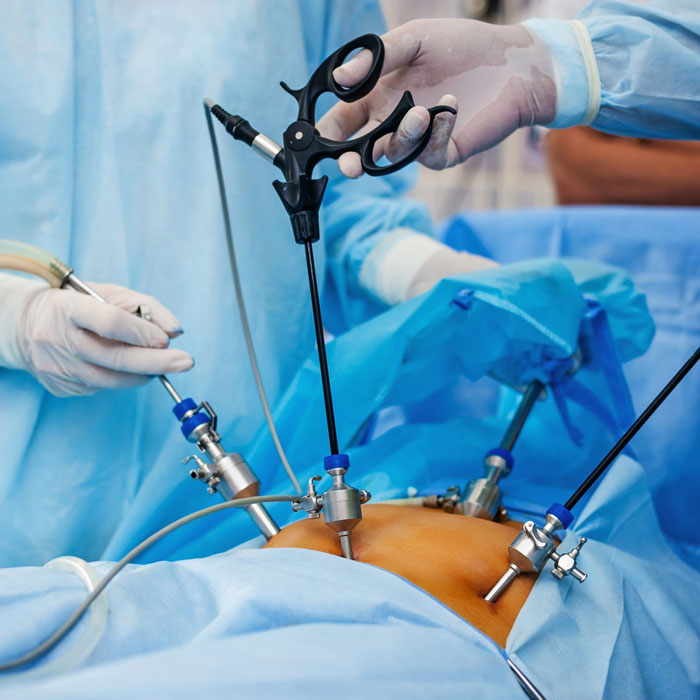Endometriosis is a disease that often (and always in its deep form) causes distortion in the normal pelvic anatomy due to formation of adhesions1. This means that the disease itself as well as every effort to remove lesions laparoscopically can jeopardise organs such as the bowel, the bladder, the ureters (the tubes that connect the kidneys to the bladder) etc.
In the past, surgical management of endometriosis was performed by general gynaecologists with experience in laparoscopic surgery who, however, did not necessarily have significant exposure to management of endometriosis. In the recent years, however, things have changed. It is widely recognised that we need gynaecological surgeons with special training in endometriosis surgery2, who, in cooperation with other specialties (eg. colorectal surgeons, urologists etc.) can safely remove deep endometriosis lesions3.
So, why do we need surgeons with special training in endometriosis surgery?
- Firstly, because, as we mentioned earlier, the disease causes distortion of the normal anatomy, posing a unique challenge to the surgeon with little or no relevant experience.
- Secondly, there exist multiple indications that we get better results when endometriosis lesions are removed (rather than ablated)4-6. Their surgical removal requires significant surgical skill.
- Thirdly, the best possible outcomes are achieved when the nerves of the pelvis are left intact (nerve-sparing approach)7. To achieve this, one needs to have relevant training and surgical skill8.
- Lastly, since the disease often infiltrates other organs, it is important for the surgeon to be familiar with this as well as have a team of expert colleagues with the aim of completely removing the disease9.
For the reasons stated above, there is a need for gynaecological surgeons with special training in the surgical management of deep infiltrating endometriosis (DIE).
References:
- Porpora MG, Koninckx PR, Piazze J, Natili M, Colagrande S, Cosmi EV. Correlation between endometriosis and pelvic pain. J Am Assoc Gynecol Laparosc. 1999 Nov;6(4):429-34.
- Pécout M, Jean Dit Gautier E, Doucède G, Collinet P, Rubod C. Pelvic endometriosis: Refer to the surgeon at the right moment: Pelvic endometriosis: When refer to the surgeon? J Gynecol Obstet Hum Reprod. 2020 Apr;49(4):101701.
- Moawad GN, Tyan P, Abi Khalil ED, Samuel D, Obias V. Multidisciplinary Resection of Deeply Infiltrative Endometriosis. J Minim Invasive Gynecol. 2018 Mar-Apr;25(3):389-390.
- Pundir J, Omanwa K, Kovoor E, Pundir V, Lancaster G, Barton-Smith P. Laparoscopic Excision Versus Ablation for Endometriosis-associated Pain: An Updated Systematic Review and Meta-analysis. J Minim Invasive Gynecol. 2017 Jul-Aug;24(5):747-756.
- Wykes CB, Clark TJ, Chakravati S, Mann CH, Gupta JK. Efficacy of laparoscopic excision of visually diagnosed peritoneal endometriosis in the treatment of chronic pelvic pain. Eur J Obstet Gynecol Reprod Biol. 2006 Mar 1;125(1):129-33.
- Fleisch MC, Xafis D, De Bruyne F, Hucke J, Bender HG, Dall P. Radical resection of invasive endometriosis with bowel or bladder involvement–long-term results. Eur J Obstet Gynecol Reprod Biol. 2005 Dec 1;123(2):224-9.
- Ceccaroni M, Clarizia R, Bruni F, D’Urso E, Gagliardi ML, Roviglione G, Minelli L, Ruffo G. Nerve-sparing laparoscopic eradication of deep endometriosis with segmental rectal and parametrial resection: the Negrar method. A single-center, prospective, clinical trial. Surg Endosc. 2012 Jul;26(7):2029-45.
- Darwish B, Roman H. Nerve Sparing and Surgery for Deep Infiltrating Endometriosis: Pessimism of the Intellect or Optimism of the Will. Semin Reprod Med. 2017 Jan;35(1):72-80.
- Ugwumadu L, Chakrabarti R, Williams-Brown E, Rendle J, Swift I, John B, Allen-Coward H, Ofuasia E. The role of the multidisciplinary team in the management of deep infiltrating endometriosis. Gynecol Surg. 2017;14(1):15.

